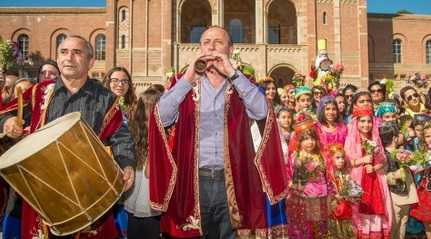
21 March 2022; MEMO: Iranians on Monday marked the beginning of the new Persian year, Nowruz, with festive fervour, after two years of COVID-19 restrictions, Anadolu News Agency reports.
Nowruz, which means 'new day' in Persian, coincides with the spring equinox, which falls on 21 March every year.
This year's celebrations are relatively grand as coronavirus restrictions have been gradually eased in recent months in the wake of a drop in infections and deaths from the pandemic.
In the days leading up to Nowruz, markets and malls in Tehran and other cities saw a tremendous rush of shoppers, who had for the past two years been confined to homes.
"It feels we are alive again, celebrating festivals, meeting friends, doing normal things that had become a luxury in the last two years," Alireza Hashemi, a Tehran-based university student, told Anadolu Agency.
For Hashemi and his family, like all Iranian families, Nowruz is a celebration of renewal and change, as it heralds the arrival of spring after harsh winter.
As a traditional practice, Iranians decorate their homes with Haft-seen table on Nowruz, filled with seven items that spell with letter "S": Sabzeh (fresh greens), Samanu (wheat paste), Senjad (jujube), Seeb (apple), Seer (garlic), Sirkeh (vinegar) and Somaq (sumac).
The festival, also celebrated in Afghanistan, Tajikistan, Turkiye, Azerbaijan, Kazakhstan, Kyrgyzstan and Turkmenistan, was registered on the UNESCO list of the intangible cultural heritage of humanity in 2009. A year later, the UN General Assembly proclaimed 21 March as International Nowruz Day.
In his Nowruz message late on Sunday, Iran's Supreme Leader, Ayatollah Ali Khamenei, gave the slogan of "production" for the upcoming year, calling it a key to solving economic problems of the sanctions-battered country.
In a swipe at the US, he said "one of the sweetest events" of the past year was Americans "acknowledging defeat in their maximum pressure policy against Iran".
President Ebrahim Raisi in a message said his government's top priority this Iranian year will be to "boost employment and create new jobs", which he called the "root cause of all economic and social woes."
In its statement, Iran's Foreign Ministry said this year marks the beginning of a new century, wishing for a "world full of justice and peace and free from oppression and coercion."
New Year celebrations in Iran last a few weeks, before and after 21 March.
One of the traditional pre-Nowruz events is a fire festival called Charshanbe Soori, which marks the last Wednesday of the Iranian year.
People burn the fire and then jump over it, believing that sorrow and evil are poured into it and joy and goodness come out of it, as per an ancient Zoroastrian tradition.




